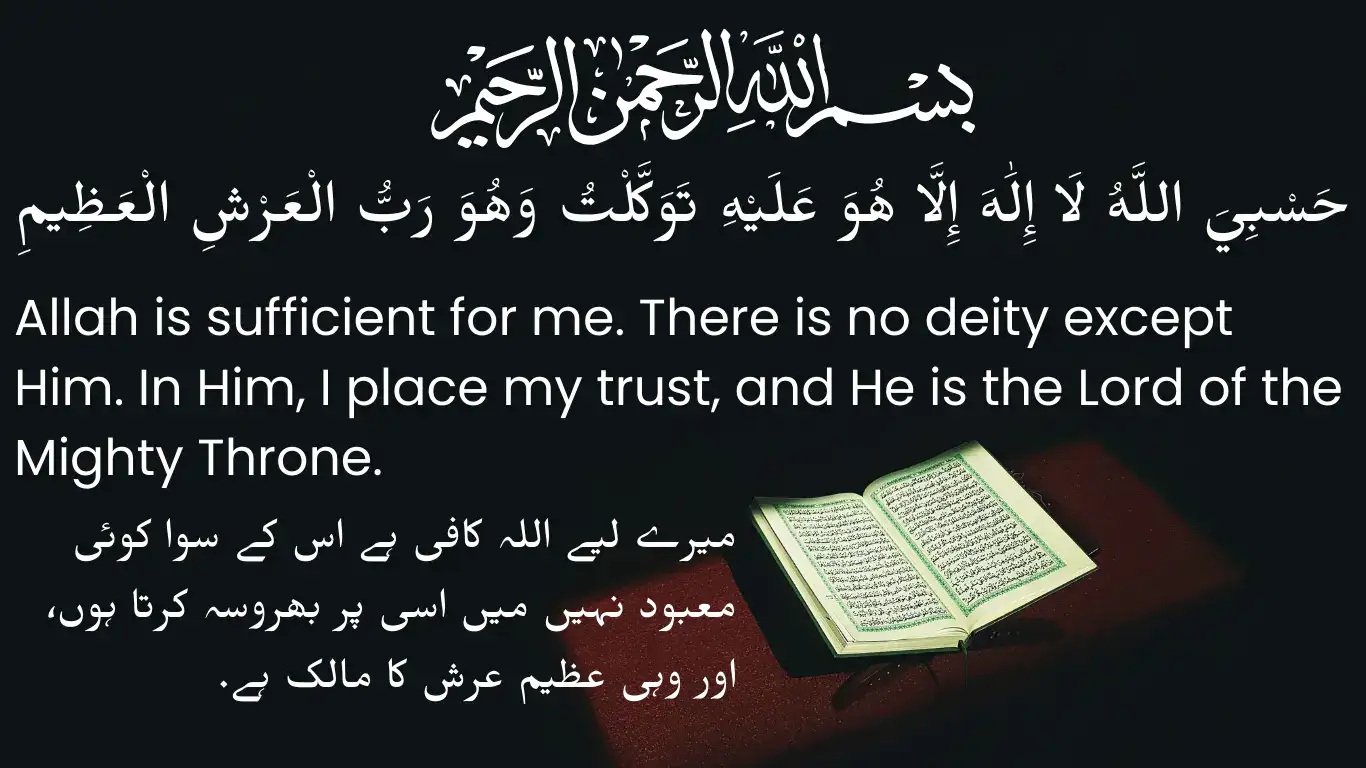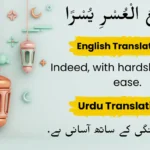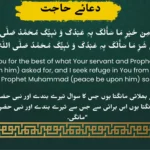Introduction
Hasbi Allah Dua is a powerful Islamic invocation that reflects trust, reliance, and unwavering faith in Allah (SWT). This beautiful supplication highlights the essence of Tawakkul (reliance on Allah) and serves as a reminder of Allah’s greatness and His ultimate control over all affairs.
| Bismillahi Tawakkaltu Alallah Dua with Meaning |
| Summun Bukmun Umyun Fahum Layarjiun |
| Dua Allahumma Ajirni Minan Naar Meaning |
| Inna Lillahi Wa in Allah e Rajioon in Arabic |
Hasbi Allah Dua: Full Text
Arabic Text:
حَسْبِيَ اللَّهُ لَا إِلَٰهَ إِلَّا هُوَ عَلَيْهِ تَوَكَّلْتُ وَهُوَ رَبُّ الْعَرْشِ الْعَظِيمِ
Transliteration:
Hasbi Allahu La ilaha illa Huwa ‘Alaihi Tawakkaltu wa Huwa Rabbul-‘Arshil-‘Azim.
English Translation:
“Allah is sufficient for me. There is no deity except Him. In Him, I place my trust, and He is the Lord of the Mighty Throne.”
Urdu Translation:
‘میرے لیے اللہ کافی ہے۔ اس کے سوا کوئی معبود نہیں۔ میں اسی پر بھروسہ کرتا ہوں، اور وہی عظیم عرش کا مالک ہے۔’
Deep Analysis of Each Verse
1. حَسْبِيَ اللَّهُ (Hasbi Allahu)
Meaning: “Allah is sufficient for me.”
This opening phrase declares complete reliance on Allah alone. It reflects a believer’s faith that Allah is all they need to overcome challenges, find solace, and achieve success. This part emphasizes the completeness of Allah’s power and mercy.
2. لَا إِلَٰهَ إِلَّا هُوَ (La ilaha illa Huwa)
Meaning: “There is no deity except Him.”
This phrase is a reaffirmation of Tawheed (the oneness of Allah). It reminds the believer that Allah is the only one worthy of worship and the ultimate source of help and guidance.
3. عَلَيْهِ تَوَكَّلْتُ (‘Alaihi Tawakkaltu)
Meaning: “In Him, I place my trust.”
Here, the dua shifts to a personal declaration of Tawakkul. It signifies a believer’s complete dependence on Allah for all matters, be they spiritual, emotional, or worldly.
4. وَهُوَ رَبُّ الْعَرْشِ الْعَظِيمِ (Wa Huwa Rabbul-‘Arshil-‘Azim)
Meaning: “And He is the Lord of the Mighty Throne.”
This closing part glorifies Allah’s majesty and authority. The “Mighty Throne” (Arsh) represents Allah’s supreme power and His dominion over the entire universe. It reassures the believer that they are placing their trust in the One who controls all things.
Importance of Reciting Hasbi Allah Dua
- Strengthens Faith: It deepens the connection with Allah by reaffirming His sufficiency and oneness.
- Instills Peace: Reciting this dua helps alleviate anxiety and brings tranquility during hardships.
- Promotes Trust: It teaches complete reliance on Allah’s will, fostering contentment and hope.
- Powerful Reminder: It serves as a reminder of Allah’s greatness and His ability to resolve every problem.
Practical Uses of the Dua
- During Challenges: Recite it to seek Allah’s help in times of difficulty.
- Daily Invocation: Include it in your daily prayers for constant reliance on Allah.
- For Inner Peace: Repeat it during moments of stress for spiritual calmness.
Conclusion
The Hasbi Allah Dua is a timeless reminder of Allah’s sufficiency and power. By reciting and reflecting on its profound meanings, believers can strengthen their faith, trust in Allah, and find peace in all situations. This dua beautifully encapsulates the essence of Tawheed and Tawakkul, serving as a source of inspiration and reassurance for every Muslim.
FAQs:
Hasbi Allah” means “Allah is sufficient for me.” It conveys complete reliance on Allah for all matters of life.
You can recite it as often as you like, especially during hardships, for inner peace, or as a daily affirmation of trust in Allah.
This phrase refers to Allah as the “Lord of the Mighty Throne,” highlighting His supreme power and control over the universe.




